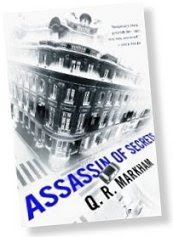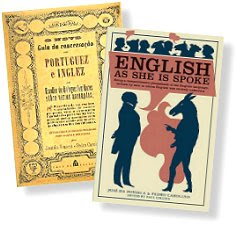
Publishers Weekly pointed out "the obvious Ian Fleming influence" which "just adds to the appeal."
The were talking about Assassin of Secrets by QR Markham, real name Quentin Rowan, part owner of a bookstore in New York. He also wrote poetry and contributed something to The Huffington Post. Markham inked a deal with publisher Little, Brown to write a series of espionage thrillers featuring a character called Jonathan Chase.
Those who blurbed the book would learn just how close their comments hit home. It did sort of validate their reviewing chops, though...
Too good to be true
Turns out that significant parts of Assassin of Secrets were reportedly borrowed from the works such as those by Robert Ludlum and, yes, about James Bond. The book was a pastiche of plagiarised material.
The New Yorker's Book Bench blog theorised that Markham was not an author as he was an artist who did "a bang-up job" in pointing out how recyclable spy novels are and how readers of the genre keep going back to the same old stuff.
Others aren't as appreciative of the genius. Little, Brown pulled the book, prompting a fire sale of sorts that sent its Amazon ranking up to 174 from 62,924 in 24 hours.
Elsewhere, Markham's contribution to The Huffington Post, ironically titled "9 Ways That Spy Novels Made Me a Better Bookseller" was removed from the mega-blog - because large parts of it were also plagiarised.
I know. I think he must've lifted more than nine parts for his spy novel, too.
The hero in Assassin of Secrets would also be familiar to those who still remember the Eighties TV series Manimal; "Jonathan Chase" is the name of the series' protagonist, played by Simon MacCorkindale. Though that could also be coincidental.
Fascinating fakery
Every time a con like this happens, I'm reminded of art forger Tom Keating. He saw the whole American-dominated art auctions industry as rotten and corrupt and did something about it. Over many years he used the techniques he learnt as an art restorer to produce fakes which he passed off as authentic pieces by the masters.
Unlike those who forged paintings for profit, his works had elements that would tip inspectors off. He wanted people to know they were fakes. For instance, he'd write messages such as "This is a fake" or "Ever been had?" on canvas with special paint that would show up in x-rays before painting over them.
He was eventually caught and went to prison. But he left the art world a sticky legacy by not naming his fakes. This meant that if an unknown Keating had not been ID-ed as a forgery, it would still fetch a high price - not quite achieving what he'd set out to do. The casual collector might even feel the urge to collect and display a few Keatings in his living room.
It's perhaps that impulse that QR Markham might have banked on to shift copies of his shifty book, in case someone uncovered the scam. From the Amazon ranking jump, it looks like it worked.
Getting away with it
So, you might be asking, as did Book Bench and a number of others: "How did Rowan think he’d get away with this, especially in the era of Google?"
When this story first broke, I was with the camp that says he expects being caught eventually. It's perhaps a matter of how long he could keep the scam going.
Then, what about the editors? The publishers? Couldn't they have seen it coming?
I say, not too likely. Publishers and lit agents in the US get lots of submissions and books to the point where they don't even have the time for a Google- or Copyscape-powered fact check, which I think would not be uppermost in the to-do list of a beleaguered editor or book reviewer with a deadline snapping at his heels.
Also, would they even know what to look for?
Thank goodness for the Google, which has helped open up online sleuthing to those who have the time and tenacity. In time, publishing houses would be thinking of ways to ensure there would be no repeats of this incident.
But I don't think this would mean the end of the likes of QR Markham.
"...there was nothing I could do..."
Just when I thought it wouldn't happen so soon, it did. Markham himself ended speculation over his motives which were, sadly, not quite as "artistic" as some had presumed.
In a long Q&A in a blog post's comments section, between him and one of the authors who blurbed his book, he claims to have caved in under the pressure of living up to everyone's expectations of him being this young wunderkind writer. When he couldn't, he started borrowing bits from here and there that would make himself look the part.
Unlike some plagiarists, he did lose sleep over it. He seems to know that it was only a matter of time. Instead of owning up earlier, however, he felt that:
...I'd already thrown the dice so long ago by that point I felt there was nothing I could do but play the out the awful pantomime... I can only compare it to other kinds of obsession or addictive behavior like gambling or smoking: in that there was no need to do it initially, but once I'd started I couldn't stop and my mind kept finding ways to rationalize the behavior. Even though, somewhere deep in the chasms of my thick brain, I knew it would destroy me.
Such a waste. Like that other cautionary tale closer to home.
And pity the publisher, whom I didn't know got burned by another famous case of plagiarism a few years ago.
It's not as if he's a bad writer. Markham - or should I say, Rowan - managed to articulate his thoughts pretty well. But his excuse comes off a bit lame to me. Why should he care about what people thought?
Had he confided to someone that he might be, hypothetically, contemplating plagiarism to take the heat off himself, that someone might've set him and kept him straight.
There was something he could have done. But I guess we'll never know.
Categories:
Book Blab

















